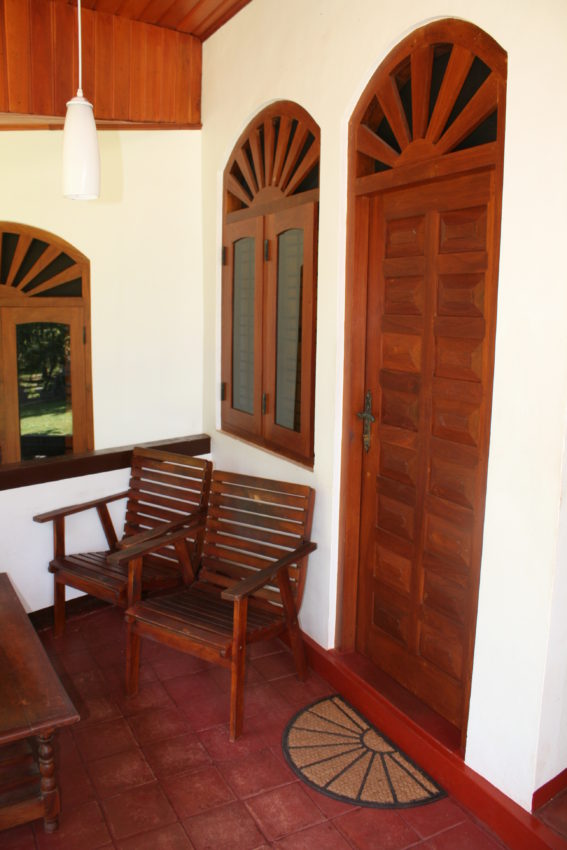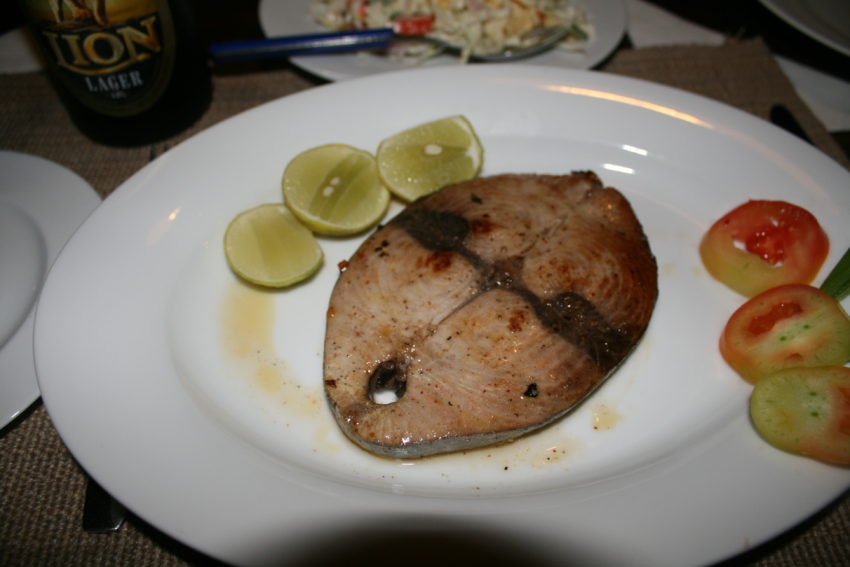Road to paradise pockmarked with potholes of dying cell phones, Indian visas and chaotic Sri Lankan bus stations

GOYAMBOKKA, Sri Lanka — I finally landed in paradise, land of Arthur C. Clarke and swaying palm trees and white sugary sand and wild elephants basking in the sun.
I’m just doing it without any contact to the outside world.
My iPhone4s never recovered. The guys at the SoftBank cell phone store in Colombo did everything they could and couldn’t get it past a 23 percent charge. I arrived at SoftBank after a sweltering morning in a steam bath of an Internet cafe trying to get an Indian visa. They still had my iPhone hooked up like a patient on life support. Sahar, the kind, bearded shop manager, told me in very broken English, “The problem is you need a new phone.” In less technical terms, the IC charger is beyond repair. I wasn’t shocked. When you see your iPhone tied up to tubes for two days, like the mother of a child who’d been hit by a truck, you prepare for the worst. The worst is I will be shelling out major euro for a new phone. I checked prices here and iPhones are the only things expensive in Sri Lanka. An iPhone6+ is about $850 or about three months salary for these people. I’m going back to Rome, buy an iPhone and consolidate it with my little Italian cell. Until then, I will be free of the trappings of modern man. I will actually talk to people instead of texting people.
Imagine that.
However, I was already in a good mood. Through five attempts and many F-bombs, I successfully applied for my Indian visa. I went to the sweatshop of an Internet cafe and went through the form, this time, the Visa on Arrival form, which is the same as the Online Visa form except India’s immigration office will go to any lengths to confuse you. Keep in mind, Indian bureaucracy is unlike anywhere in the world. You must fill out half a dozen forms just to acquire a bus ticket, let alone a visa. And they are so particular, your application will be rejected if your visa photo doesn’t have the right smile.
I’d filled it out about 10 times, unsuccessfully. I had memorized every question, memorized every fake address and hotel I used to fill in the stupid, unnecessary bullshit blanks. When it came time to download my awful picture, a sign came up reading, “Google Plus is about to crash. Please try again later.” So I did. Five minutes later. Same thing. “Google Plus is about to crash. Please try again later.” I sweated so much, my face had the texture of a soggy head of cauliflower. Good Lord, I sweated through my thick purple cargo shorts. My fingers were so wet I made typos every other word. Suddenly, I missed my Rome apartment over Christmas, wearing a scarf and stocking cap while writing.
I had lost my sweet disposition. I lost everything. Soon, the sleepy Internet clerk was looking up in his English-Singhale dictionary the English phrase, “MOTHER, FUCK ME IN THE ASS!” I think he understood when I screamed, “WHY DOESN’T ANYTHING EVER WORK FOR ME!”

He came over and looked. He said, “Try it again.” Same thing. He said with a very inappropriate smile, “Looks like Google Plus isn’t working today.”
Oh, Christ! Let’s get this damn thing over with. Doom filled my brain. I could be spending my days in Sri Lankan Internet cafes, possibly rerouting my trip to avoid spending one day in India because of an elusive visa — then shooting up every Indian citizen I can find.
I went across the street to another Internet cafe. It looked like the Hilton compared to the youth hostel I left. It had air-conditioning, comfortable chairs. But once again, India managed to screw me. I downloaded my picture and it wouldn’t take a PDF file. Only JPEG. I looked in my emails and found my JPEG photo. Boom. It worked. I tried downloading my passport page. Nope. It’s only a PDF.
I called over the clerk, a teenager about 5 feet tall with missing teeth. He leaned over my shoulder and using one hand as deftly as a surgeon, called up a website, found the PDF-to-JPEG link and my passport page was in JPEG.
So, for the fifth time that morning and eighth time in two days, I filled out the form. BINGO! It worked. At least, I applied successfully. It still must be approved. If I’m not approved I will instead go to Pakistan and direct one of its nukes on downtown Delhi.
I couldn’t wait to escape Colombo. In three days I never escaped the neighborhood of Pettah. There is nothing around my Port View City Hotel except cheap retail shops and dust. I explored the neighborhood and the only food I found for lunch was a real dodgy sandwich behind a dirty glass pane in a tiny shop. It was called a Fish Bun. Let’s see. Fish left behind unrefrigerated glass since possibly British occupation? I went back to my backpack and ate a Clif Bar.
Fortunately, the rice curry dish, my first of Sri Lanka’s national diet staple, was fantastic. It was in Colombo’s chaotic Central Bus Station in a self-catering buffet line. On a big pile of white rice, the guy scooped on piles of chicken, lentils, beans, vegetables and fish. It was all piping hot, reasonably spicy and as local as you’re going to get. I was the only white guy in a room packed full of locals getting the hell out of steaming Colombo.
Of course, nothing is easy for me in Sri Lanka. Neither was leaving town. The Central Bus Station is chaos. It’s a long corridor with signs showing destinations in Sinhala, Tamil and English. A bus pulls up to the designated destination sign, people line up and pour in. There are no signs for the A-C buses that are marginally more expensive but the apparent difference is like between a bed at the Four Seasons and a bed of nails. My bus was leaving at 2:30 p.m. I arrived at 1. After double checking for the fourth time, the man in the booth labeled, almost libelously, “CONSULTANTS BOOTH,” said my bus broke down. The next bus leaves at 3:30. So I sat on a flimsy red plastic chair with the back blown out as if victim of an irate gunman whose bus had broken down.
Swiss Air this was not.
The bus station is a microcosm of the ethnic mix that is Sri Lanka. Colombo is truly the crossroads of Asia: It’s about 70 percent Buddhist, 13 percent Hindu, 10 percent Muslim. I saw Muslim women with only their eyes showing, curiously impervious to the suffocating humidity in all that black fabric. I saw Hindus in the triangular caps and Buddhists in long robes. From a distant mosque I could hear the Muslim call to prayer. A crazed, old man in rags began rambling at me with a wild-eyed expression of a man who’d seen too much of the civil war and wanted too desperately to share his politics.
At 3:10, I walked to the bus which arrived. It was full. I stood up in the middle of the bus, my head brushing the roof of the bus, and said, “WHAT ELSE COULD GO WRONG HERE? HOW THE HELL DO YOU GET OUT OF THIS TOWN?” I saw a Muslim man stare at me, my eyes red, my fists clenched, and sink deeper into his seat.
I went to the consultants booth and asked when the next bus left. He said, “Come here.” He found one of his young workers who took me on the bus. He pointed to a guy sitting in the first row and said something in Sinhala. I got up and the young man pointed to me. He pointed to the seat. I would’ve hugged him if I wasn’t soaking wet.
The only good thing about spending my first three days in Sri Lanka doing business is I’ve learned the Sri Lankans are as accommodating as any I’ve ever met. From the techies to the Internet cafe geek to the bus station staff, everyone has bent over to help every problem I had. I could not have been more pleased to be in Sri Lanka than I was winging my way south down the coast road toward paradise.
It took us one hour to get out of Colombo. I saw nothing appealing. Not one nice park, a pretty building, a nice restaurant. It’s like a city designed to sell electronics and cheap clothes. I haven’t seen a postcard. However, once we cleared city limits the country opened up like a flower. Giant green palm trees were everywhere. Entire forests enveloped small houses where people gathered and chatted on bicycles. Houses stood on stilts where people on their balconies could touch the palm trees that were nearly as big as their decks. Red clay roads snaked up into the jungle. I saw a sign reading, “DANGER: PEACOCKS AHEAD.”
On the coast road I saw the moon, full as a big wheel of cheese, shining above a relatively clean river as it flowed toward the sea. It screamed for a photograph. Clarke, the famed British science fiction writer (“2001: A Space Odyssey”), moved here in 1956 and stayed until he died in 2008. I could now see why.
Paranoid, I kept asking the nice bus clerk about Goyambokka Road, the address of my guesthouse in the tiny beach village of Goyambokka (pop. 50). Goyabokka Road is called “narrow” by Lonely Planet and easily missed by foot let alone a speeding bus. The driver, tall and husky and frowning, apparently knew it. He told me to stay calm.

Sure enough, they pulled up on a pitch black patch of the highway. I got out and the bus clerk pointed across the street. He seemed to point at bushes. I shrugged, picked up my two backpacks and skirted the side of the road. I finally found a tiny paved alley and walked up it, toward an increasingly enlarging flashlight. I asked, “AI-a-bowen! Goyambokka Guesthouse?” (Hello! Goyambokka Guesthouse?) A severely retarded boy mumbled something with his crooked mouth and pointed behind him. I crested a hill and finally saw some flickering lights. Then I saw a guesthouse with some white people dining in a giant garden. “Do you want a room?” said a man standing outside. He pointed me down the hill and I finally found Goyambokka Guesthouse. It’s a semicircle of white-washed rooms all with terraces on red tile. They point out to a collage of fruit trees. The room has a four-poster bed with mosquito nets. I could hear the roar of the surf seemingly just down the path.
I kicked myself for not reserving the room more than two days. Hell, I figured I’d be here in the morning, not 7:30 p.m. But I didn’t worry about it as I dug into a perfectly grilled tuna steak and a salad with a touch of sweet sauce. Of course, the giant bottle of Lion Lager became the exclamation point of a question mark of a day.

